Areeiro, Lisbon
Areeiro | |
|---|---|
|
Clockwise: Fonte Luminosa; Carneiro monument; Garden Fernando Pessa; Parish street view; Abóboda Celeste; Bairro Arco do Cego | |
 | |
| Coordinates: 38°44′31″N 9°08′02″W / 38.742°N 9.134°W | |
| Country | |
| Region | Lisbon |
| Metropolitan area | Lisbon |
| District | Lisbon |
| Municipality | Lisbon |
| Area | |
| • Total | 1.74 km2 (0.67 sq mi) |
| Population (2021) | |
| • Total | 21,160 |
| • Density | 12,000/km2 (31,000/sq mi) |
| Time zone | UTC±00:00 (WET) |
| • Summer (DST) | UTC+01:00 (WEST) |
| Patron | John of God and the Twelve Apostles |
| Website | http://www.jf-areeiro.pt/ |
Areeiro (Portuguese pronunciation: [ɐˈɾjɐjɾu]) is a freguesia (civil parish) and typical quarter of Lisbon, the capital city of Portugal. Located in central Lisbon, Areeiro is east of Avenidas Novas, east of Marvila, south of Alvalade, and north of Beato, Penha de França, and Arroios. The population in 2021 was 21,160.[1][2]
History
[edit]Located in the ancient parish of Alto do Pina there are the ruins of the vacation house of the consort king of Portugal Ferdinand II.
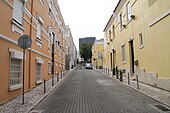

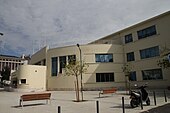

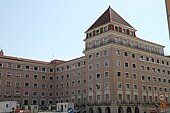



The former parish of São João de Deus was extensively urbanized during the Estado Novo, becoming a favorite for the upper-middle and upper classes. Alto do Pina, on the other hand, encompassed construction poles that were very different from each other. Among the architects involved are some of the most famous names in architecture from the first half and mid-20th century in Portugal:
- Alberto Pessoa
- Anselmo Fernandez
- António Lino
- António Reis Camelo
- Arnaldo Redondo Adães Bermudes
- Arthur Bentes
- Carlos Rebello de Andrade
- Cassiano Branco
- Dário Silva Vieira
- Edmundo Tavares
- Eduardo Read Teixeira
- Filipe Nobre de Figueiredo
- Guilherme Rebelo de Andrade
- Inácio Peres Fernandes
- João Faria da Costa
- João Simões
- Joaquim Bento de Almeida
- Joaquim Ferreira (architect)
- José Alexandre Gomes Bastos
- José Ângelo Cottinelli Telmo
- José Segurado
- Jorge de Almeida Segurado
- Jorge Ribeiro Ferreira Chaves
- Lucínio Cruz
- Luís Américo Xavier
- Luís Benavente
- Luís Cristino da Silva
- Manuel Joaquim Norte Júnior
- Meir Bensusan
- Nuno Morais Beirão
- Porfírio Pardal Monteiro
- Raúl Chorão Ramalho
- Raul Rodrigues Lima
- Raul Tojal
- Rogério Buridant de Castro Martins
- Rui Jervis Atouguia
- Sebastião Formosinho Sanchez
- Sérgio Andrade Gomes
- Victor Palla
- Antonio Varela
In 1959 both São João de Deus and Alto do Pina were amongst the 12 parishes created by the administrative reform of the city of Lisbon on February 7, 1959. It remained an independent parish until 2012.[3]
For the new parish of São João de Deus, the symbols chosen were:[4]
- Coat of Arms: On a golden shield, two blue sheathed swords with black handles, crossed and placed in saltire, accompanied at the top by a pomegranate of green, open and red, topped by a black cross, and on each side, a red rose buttoned of the field and pointed of green. Above, a silver mural crown with three towers. Below, a white scroll bearing the black uppercase legend: "S. JOÃO de DEUS - LISBOA".
- Flag: Green. Gold and green cord and tassels. Gold staff and spear.
- Seal: As required by law, with the legend: "Junta de Freguesia de S. João de Deus - Lisboa".
The opinion was issued by the Heraldic Commission of the Association of Portuguese Archaeologists on March 25, 1996, in accordance with Law No. 53/91, of August 7. Established, upon proposal of the Parish Council, in a session of the Parish Assembly on April 30, 1996, published in the Official Gazette, III Series, No. 163, of July 16, 1996 and registered in the Directorate-General of Local Authorities under No. 39/96, of July 31, 1996.
The justification of the Symbols are:

- Two swords: Represent the Battle of Alvalade, a military confrontation between King D. Dinis and his son Prince D. Afonso (future King D. Afonso IV), which took place in 1323 in the parish.
- Pomegranate: Represents St. John of God, after whom the parish is named, being the symbol of the Hospitaller Order of St. John of God.
- Two roses: Represent the peace-making intervention of Queen Santa Isabel, who managed to restore harmony between her husband and her son, perpetuated in the commemorative standard erected in the parish.
For the newly created parish of Alto do Pina, the symbols chosen were:
- Coat of Arms: On a golden shield, a heraldic fountain between three red donkeys, arranged in chief, in fess and in mount of green, rooted and issuing from the base. Above, a silver mural crown with three towers. Below, a white scroll bearing the black legend: "ALTO do PINA".
- Flag: Blue. Gold and blue cord and tassels. Gold staff and spear.
- Seal: As required by law, with the legend: "Junta de Freguesia de Alto do Pina - Lisboa".
The opinion was issued by the Commission on February 27, 2004, published in the Official Gazette, III Series, No. 154, on July 2, 2004, and registered in the Directorate-General of Local Authorities under No. 170/2004, in August 2004.
The justification of the Symbols are:
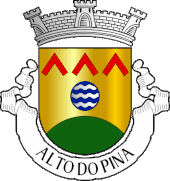
- The heraldic fountain symbolically represents the Monumental Fountain of Alameda D. Afonso Henriques, commonly known as the Fonte Luminosa.
- The donkeys represent the three population nuclei of the parish (1- Bairro dos Actores, Alameda D. Afonso Henriques, Avenida Almirante Reis, and Praça Francisco Sá Carneiro; 2- Bairro das Olaias, Avenida Afonso Costa, Rua Sarmento de Beires, and Casal Vistoso; 3- Social Housing Estates – Bairro Portugal Novo and Bairro Alto do Pina/ Quinta do Monte Coxo).
- The mount represents the toponym of the parish, "Alto do Pina".
The territory of today's parish witnessed a major rally held by the Portuguese Socialist Party during the post-revolutionary period of 1975, attacking the influence of the Portuguese Communist Party.
This freguesia was created with the 2012 Administrative Reform of Lisbon, merging the former parishes of Alto do Pina and São João de Deus.[5]
Demographics
[edit]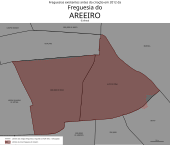
Historical resident population (before the 2012 Administrative Reform)
[edit]The resident population recorded according to Censuses carried over the years is shown in the following tables for the two parishes that today constitute Areeiro. It is noteworthy that the ancient parish of São João de Deus lost 15,145 people from 1960 to 2011 or 60.72% of its 1960 population, not having recorded a single population gain since 1960. Similarly, the ancient parish of Alto do Pina lost 2,237 people or 17.8% of its population from 1960 to 2011, with major population losses recorded in the nineties (-19%).
| São João de Deus | Alto do Pina | ||||||||||||||||||||||||||||||||||||||||||||||||
|---|---|---|---|---|---|---|---|---|---|---|---|---|---|---|---|---|---|---|---|---|---|---|---|---|---|---|---|---|---|---|---|---|---|---|---|---|---|---|---|---|---|---|---|---|---|---|---|---|---|
|
| ||||||||||||||||||||||||||||||||||||||||||||||||
Current resident population (after the 2012 Administrative Reform)
[edit]In the 2021 Portuguese Census was recorded the first demographic growth of the parish since 1960. In particular, from 2011 to 2021 the parish gained 1,029 people, recording a growth of +5.11%.
| Former Parishes | Current Parish | |||||
|---|---|---|---|---|---|---|
| Parish | Population
(2011)[6] |
Area
(km2)[7] |
Parish | Population
in 2011 |
Population
in 2021 |
Area
(km2) |
| São João de Deus | 9,798 | 0.93 | Areeiro | 20,131 | 21,160 | 1.74 |
| Alto do Pina | 10,333 | 0.84 | ||||
Demographic statistics
[edit]- Age
The last censuses show that the parish's population is ageing at a fast pace: in 2021 21.25% of the population was below 25 and, at the same time, almost a quarter (23.92%) of the residents was 65 or older.
| Distribution of Population by Age Groups[8] | |||||||||||||
|---|---|---|---|---|---|---|---|---|---|---|---|---|---|
| Year | 0-14 Years | 0-14 Years % | 15-24 Years | 15-24 Years % | 25-64 Years | 25-64 Years % | > 65 Years | > 65 Years % | |||||
| 2021 | 2,279 | 10.77% | 2,217 | 10.48% | 11,102 | 52.47% | 5,062 | 23.92% | |||||
- Religion
Religion in Areeiro (Census 2021)[9]
The parish is predominantly catholic and 67.99% of the population aged 15 or above are followers of a Christian or Jeovah's Witness denomination as of 2021.
Interestingly, around 27.96% of the population doesn't practice a religion and is thus non religious.[10]
The presence of minor religions such as Islam, Hinduism and Buddhism (4.05% of the population amongst the three) is probably due to an increasing community of people coming from India, Pakistan, Bangladesh or Nepal.
- Immigration
In 2021, 7.86% of the population of the parish was constituted by foreigners. In particular, amongst men foreigners were 8.95% of the total. This means that in Areeiro there are 1,663 resident foreigners, a sharp increase from 2011, when there were 1,071 resident foreigners (5.32%). Since the foreign population increased by 592 people from 2011 to 2021 and given that the total population of the parish increased by 1,029 units in the same timespan, it is noteworthy that the total population growth was due for more than half to the increase in the number of resident foreigners, thus not counting people who have acquired Portuguese nationality in the meantime.[11] The largest group of foreigners is constituted by the Brazilians (540 people or +53.41% since 2011), PALOP countries (170 people or +17.24% since 2011), Chinese (154 people or +50.98% since 2011) and people from the Indian Subcontinent, most notably Nepalis and Bangladeshis, totaling 261 people, or recording an increase of +455.32% since 2011.[12]
Dealing with the foreign-born population, 15.27% of the parish's population was born abroad as of 2021. The most common countries of birth were PALOP countries (1,066 people), Brazil (813 people) and the Indian Subcontinent (325 people).[13] Of the Portuguese nationals born abroad, the most common countries of birth were PALOP countries (908 people) and Brazil (267 people), all countries having ancient historical ties with Portugal as well as a rooted migration history towards the country, and who are, thus, more likely to have acquired Portuguese citizenship along the years.[14]
Moreover, as of 2021 in the parish there were 2,410 people who have entered Portugal after 2010, constituting 11.39% of the population. Of those with recent migrant background, 23.03% were Portuguese nationals returning from a period of emigration abroad.[15]

Amongst the Portuguese, 3,753 had already lived abroad as of 2021 (19.25% of the Portuguese population). The majority of those having lived in Angola and Mozambique (1,194 people) entered Portugal in the Seventies (725 people or 60.72%), following the independence of the two former colonies (so called retornados). Those coming from countries hosting large Portuguese emigrant communities such as France, Spain, Germany, Switzerland, Luxembourg or Belgium (724 people) have mostly entered Portugal after 1991 (72.24%), probably due to the development of the Portuguese economy since its accession to the EU. Interestingly, 37.59% of the Portuguese nationals having lived in the UK and residing in the parish, has left the UK after 2016, (date of the Brexit referendum).[16]
If the whole population (regardless of the nationality held) is taken into account, then 25.00% of the parish's population has already lived abroad for at least one year as of 2021, with EU countries, PALOP countries, Brazil and the United Kingdom being the most commonly cited countries of previous residence.[17]
Economy and Social conditions
[edit]Employement
[edit]In the parish of Areeiro there are 760 residents who, as of 2021, were unemployed. Of these, 42.63% received a state-fund subsidy or pension (41.34% in Lisbon).[18] In 2021 the unemployment rate in the parish is slightly lower than the one recorded for Lisbon and for Portugal as a whole, standing at 7.31%. In the same year, Portugal as a whole had an unemployment rate of 8.13% that has progressively decreased to 6.1% in 2023. As the statistics dealing with unemployment at the parish level are available only every 10 years, the current (2023) unemployment rate in Areeiro is unknown.[19][20] Amongst youth aged 15–24 the unemployment rate in 2021 in the parish stood at 15.53%, 16.86% lower than in the rest of the country.[21]
On the other hand, in 2021 9,641 residents were employed, of which 72.34% were employees and 24.78% were independent workers.[22] Below is the table showing the employment rate per age group. The low share of people aged 20–24 employed is due to the fact that many are still in education (e.g. university) while the low proportion of those in employment aged 60–64 is due to many being early pensioners.[23]
| 2021 Census data | Age group | ||||||||
|---|---|---|---|---|---|---|---|---|---|
| 20-24 | 25-29 | 30-34 | 35-39 | 40-44 | 45-49 | 50-54 | 55-59 | 60-64 | |
| Share of people in employment | 33.05% | 77.92% | 80.67% | 82.35% | 84.37% | 83.15% | 79.10% | 74.98% | 61.72% |
Dealing with commuting, the residents of Areeiro spent 20.55 minutes of daily commuting, 2 minutes less than the average inhabitant of Lisbon.[24]
Social conditions
[edit]
Dealing with overcrowding in the parish's households, 4.82% of the population lives in accommodations where they have less than 15 m2 per capita (8.71% for Lisbon and 5.65% in Portugal as a whole), while 48.06% live in houses with more than 40 m2 per capita (39.64% for Lisbon and 46.84% in Portugal as a whole).[25] There are 7,294.2 dwellings per km2 (3,200.5 for Lisbon and 64.9 in Portugal as a whole).[26]
49.8% of the population lives in owned dwellings as of 2021; this is slightly lower than the values recorded both for Lisbon (50.3%) but significantly lower than the one recorded for Portugal (70%).[27] The average height of a residential building in Areeiro is 5.2 floors as of 2021[28] and the average area of a dwelling stands at 106.16 m2 (with the average in Lisbon-city 93.07 m2 being and in Portugal 112.45 m2).[29]
The average monthly rent value of leased dwellings recorded in 2021 stood at €601.87, 27.82% higher than the Lisbon average in the same year (€470.87).[30] It is nonetheless important to notice that the value of the rents is quite low because of many contracts stipulated decades ago, with 13.38% (25.34% in Lisbon) of the dwellers paying less than €150/month[31] because of the rent-freezing system that was adopted in Portugal in the late XX century, allowing that many people, now mostly elders, don't have to pay high rents.[32][33][34] Due to the housing crisis and inflation, in 2023 the average rent for new contracts (frozen contracts aren't concerned) stood in fact at €13/m2 in Areeiro, meaning that for the average 106.16 m2 dwelling are necessary around €1,380/month.[35][36][37][38][39][40][41]
Dealing with housing prices, it is interesting to remark that if the median price per m2 stood at €1,803 for a house sold in early 2016, this value had risen to €3,559/m2 in early 2021 and to €4,072/m2 in 2023, experiencing a growth of +125.85% in just 7 years. In the same period the growth of house priced per m2 in Lisbon as a whole was +117.6%, from €1,875/m2 to €4,080/m2.[42]
Of the 1,377 residential buildings listed in the parish, 0.65% were built before 1919, 68.19% from 1919 to 1960, 22.95% from 1961 to 1990, 3.49% from 1991 to 2000 and 4.72% after 2001. Of the buildings built before 1919 55.56% had 1 to 3 floors, while in buildings built between 1981 and 2010 the proportion of buildings with 6 stories or more is 50.51%. Interestingly, the newer and higher the building the higher the probability of it being served by an elevator. For homes built before 1946, only 10.25% have access to an elevator as of 2021; this percentage ascends to 57.58% for buildings dating from 1981 to 2010.[43] Always with regard to amenities, 25.61% of the houses had access to air conditioning (20.98% in Lisbon), 78.47% to heating (69.62% in Lisbon) and 23.88% to a parking place (28.04% in Lisbon).[44][45][46]
As of 2021 there were 1,758 vacant dwelling in the parish.[47] Of the vacant dwellings, 1,028 are vacant for rental or with the purpose of being sold, while 730 are vacant for other reasons, often abandoned, awaiting their demolition or because a reason for conflict among heirs.[48][49][50][51][52] Moreover, as of 2023 247 apartments are registered as "Alojamento Local", meaning they have the license to be rent on platforms such as Booking.com or Airbnb.[53][54]
In the parish there were no records of homeless people.[55] The parish is nonetheless actively promoting initiatives aiming at helping people in situation of permanent of temporal homelessness.
Landmarks
[edit]




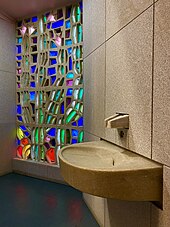

- Alameda Dom Afonso Henriques
- Avenida de Paris, Praça Pasteur, architectural complex designed by architects Raúl Chorão Ramalho, Alberto Pessoa, Lucínio Cruz and José Bastos .
- Avenida João XXI, architectural complex designed by architects Filipe Nobre de Figueiredo, José Segurado, Joaquim Ferreira (architect) and Guilherme Gomes
- Azulejo panels in Monteiro Torres[56]
- Bairro social Arco do Cego: one of the first examples of social housing in Portugal, built between the period of the First Portuguese Republic and that of the Estado Novo[57]
- Caixa Geral de Depósitos headquarters
- CGD garden monuments and sculptures[58]
- Culturgest
- Esculturas do Vices-Reis da India[59]
- Escola Secundária D. Filipa de Lencastre, an important work of Portuguese modernism, designed by the architect Jorge de Almeida Segurado
- Fonte Luminosa: Designed in 1938 by Carlos and Guilherme Rebelo de Andrade, with sculptures by Diogo de Macedo and Maximiano Alves. Inaugurated in 1943
- Fórum Lisboa[60]
- House on Av. José António de Almeida, an important work of Portuguese modernism, designed by architect Luís Cristino da Silva.
- Igreja de São João de Deus, by architect António Lino
- Instituto Nacional de Estatística: Built in 1932 by architect P. Pardal Monteiro, featuring a distinguished grand hall adorned with a frieze by Henrique Franco and a staircase stained glass by Abel Manta. Still housing the National Institute of Statistics, responsible for statistical notation, compilation, coordination, and dissemination of data. The building, including its walls and grounds, is currently undergoing classification[61]
- Instituto Superior Técnico Alameda campus, with a project by Porfírio Pardal Monteiro
- Padrão do Campo Pequeno: The Campo Pequeno Standard, ordered by Queen Saint Isabel in the 14th century, lost parts due to displacement. Remains a simple column with a commemorative plaque from Queen Isabel's intervention in a royal dispute[62]
- Pastelaria, Café and Restaurante "Mexicana", designed by Jorge Ferreira Chaves and chairs designed by José Espinho
- Praça de Londres
- Praça do Areeiro, architectural complex designed by Luís Cristino da Silva
- Monument "António José de Almeida": Monument erected by architect Pardal Monteiro, sculpted by Leopoldo de Almeida, unveiled December 31, 1937, by government initiative at the junction of Av. Miguel Bombarda and Av. António José de Almeida. Depicts statesman António José de Almeida, with Republic figure[63][64]
- Monument "Gato assanhado"[65]
- Monument "A cadeira do poder", also known as "Ad Ephemeram Gloriam"[66][67]
- Monument "A família": Hyper-realistic bronze sculpture set: a girl sits holding a butterfly; a lady sits on a bench; two boys, one standing beside the other riding a bicycle. Unveiled July 17, 2001, at Forum Lisboa Garden[68]
- Monument "Afonso Costa", also featuring a small lake[69][70]
- Monument "As Três Graças"[71]
- Monument "Caracol"[72]
- Monument "Contrapunto"[73]
- Monument "Estátua de Figura masculina"[74]
- Monument "Golden totem"[75]
- Monument "João do Rio"[76]
- Monument "O poeta e a Musa"[77]
- Monument "Pelicano"[78]
- Monument "S. João de Deus"[79]
- Monument "Stuart Carvalhais"[80]
- Monument to engineering[81]
- Monument "São João de Deus"[82]
- Monument to Francisco Sá Carneiro[83]
- Monument to Guerra Junqueiro[84]
- Quinta das Ameias ruins[85]
- Statues honouring theater[86]
- Torre Norte of Praça de Londres, designed by architect Cassiano Branco
- Torre Sul of Praça de Londres, headquarters of the Ministry of Social Security and Employment, designed by architect Sérgio Andrade Gomes (it was the tallest building in Lisbon at the time of its inauguration).
Notable people
[edit]- Maria Isabel Barreno (1939–2016): Portuguese writer
References
[edit]- ^ "Áreas das freguesias, concelhos, distritos e país". Archived from the original on 2018-11-05. Retrieved 2018-11-05.
- ^ INE. "Indicador". tabulador.ine.pt. Retrieved 2023-10-07.
- ^ "February 7, 1959" (PDF).
- ^ "Símbolos Heráldicos - brasão, bandeira e selo" (PDF).
- ^ Diário da República. "Law nr. 56/2012, pages 6454-6460" (pdf) (in Portuguese). Retrieved 21 November 2014.
- ^ "Census 2011 Parish Data" (XLSX-ZIP). 2011 Census (final results). National Institute of Statistics. 2012. Retrieved 27 July 2013.
- ^ IGP (2012). "Areas of parishes, municipalities, and districts/islands in CAOP 2012.1" (XLS-ZIP). Official Administrative Map of Portugal (CAOP), version 2012.1. Portuguese Geographic Institute. Retrieved 30 July 2013.
- ^ "População residente (N.º) por Local de residência à data dos Censos [2021] (NUTS - 2013), Sexo e Grupo etário (Por ciclos de vida)". Retrieved 2022-11-12.
- ^ "Census - Final results: Portugal - 2021". Statistics Portugal. Retrieved 2022-11-23.
- ^ "População residente com 15 e mais anos de idade (N.º) por Local de residência à data dos Censos [2021] (NUTS - 2013) e Religião". tabulador.ine.pt. Retrieved 2023-12-28.
- ^ "Proporção da população residente de nacionalidade estrangeira (%) por Local de residência à data dos Censos [2021] (NUTS - 2013) e Sexo". tabulador.ine.pt. Retrieved 2023-12-28.
- ^ "População residente (N.º) por Local de residência à data dos Censos [2021] (NUTS - 2013), Sexo, Grupo etário e Nacionalidade". tabulador.ine.pt. Retrieved 2023-12-28.
- ^ "População residente (N.º) por Local de residência à data dos Censos [2021] (NUTS - 2013), Sexo, Grupo etário e Naturalidade (País)". tabulador.ine.pt. Retrieved 2023-12-28.
- ^ "População residente (Portuguesa nascida no estrangeiro - N.º) por Local de residência à data dos Censos [2021] (NUTS - 2013), Sexo, Grupo etário e Naturalidade (País)". tabulador.ine.pt. Retrieved 2023-12-28.
- ^ "População residente que entrou em Portugal após 2010 (N.º) por Local de residência à data dos Censos [2021] (NUTS - 2013), Sexo, Grupo etário e Motivo de entrada em Portugal". tabulador.ine.pt. Retrieved 2023-12-28.
- ^ "População residente de nacionalidade portuguesa que já residiu no estrangeiro (N.º) por Local de residência à data dos Censos [2021] (NUTS - 2013), Sexo, Escalão de ano de chegada a Portugal e Proveniência (País)". tabulador.ine.pt. Retrieved 2023-12-28.
- ^ "População residente (Que residiu no estrangeiro por período contínuo de pelo menos 1 ano - N.º) por Local de residência à data dos Censos [2021] (NUTS - 2013), Sexo, Escalão de ano de chegada a Portugal e Proveniência (País)". tabulador.ine.pt. Retrieved 2023-12-28.
- ^ "População desempregada (N.º) por Local de residência à data dos Censos [2021] (NUTS - 2013), Sexo, Grupo etário e Fonte de rendimento".
- ^ "Taxa de desemprego (%) por Local de residência à data dos Censos [2021] (NUTS - 2013) e Sexo".
- ^ "Statistics Portugal - Web Portal". www.ine.pt. Retrieved 2023-12-28.
- ^ INE. "Indicador". tabulador.ine.pt. Retrieved 2023-12-28.
- ^ "População empregada (N.º) por Local de residência à data dos Censos [2021] (NUTS - 2013), Sexo, Profissão e Situação na profissão".
- ^ "Taxa de emprego (%) por Local de residência à data dos Censos [2021] (NUTS - 2013), Sexo e Grupo etário".
- ^ "Duração média dos movimentos pendulares (min) da população residente empregada ou estudante por Local de residência à data dos Censos [2021] (NUTS - 2013)".
- ^ INE. "Indicador". tabulador.ine.pt. Retrieved 2023-12-28.
- ^ "Densidade de alojamentos (N.º/ km²) por Localização geográfica à data dos Censos [2021] (NUTS - 2013)".
- ^ "Proporção de alojamentos familiares clássicos do próprio (%) por Localização geográfica à data dos Censos [2021] (NUTS - 2013)".
- ^ "Pisos por edifício (N.º) por Localização geográfica à data dos Censos [2021] (NUTS - 2013)".
- ^ "Superfície média útil (m²) dos alojamentos familiares clássicos de residência habitual por Localização geográfica à data dos Censos [2021] (NUTS - 2013)".
- ^ "Valor médio mensal das rendas dos alojamentos familiares clássicos arrendados (€) por Localização geográfica à data dos Censos [2021] (NUTS - 2013)".
- ^ "Agregados domésticos privados (N.º) nos alojamentos familiares clássicos arrendados de residência habitual por Local de residência (à data dos Censos 2021), Grupo socioeconómico do titular do alojamento e Escalão do valor mensal da renda".
- ^ Ferreira, Beatriz. "Rendas mais antigas ficam congeladas de forma definitiva". Observador (in European Portuguese). Retrieved 2023-12-28.
- ^ "Governo garante que rendas antigas vão ficar congeladas de forma definitiva". www.jornaldenegocios.pt (in European Portuguese). Retrieved 2023-12-28.
- ^ "118 anos de rendas congeladas". www.dn.pt (in European Portuguese). 2018-06-03. Retrieved 2023-12-28.
- ^ "Visão | Rendas em Lisboa aumentam 37% no espaço de um ano". Visão (in European Portuguese). 2023-01-19. Retrieved 2023-12-28.
- ^ Raposo, Frederico (2023-02-24). "Em 2637 anúncios de casas, nenhum permite arrendar em Lisboa sem gastar mais de um terço do salário". Mensagem de Lisboa (in European Portuguese). Retrieved 2023-12-28.
- ^ "Rendas da habitação subiram 11% no segundo trimestre do ano". Expresso (in Portuguese). 2023-09-28. Retrieved 2023-12-28.
- ^ "Arrendar casa em Lisboa é mais caro do que em Madrid e tão dispendioso como em Barcelona". www.dn.pt (in European Portuguese). 2023-01-19. Retrieved 2023-12-28.
- ^ "Veja aqui os preços das casas em todas as freguesias de Lisboa e do Porto: há aumentos de 30%". CNN Portugal (in Portuguese). Retrieved 2023-12-28.
- ^ "Visão | Renda média em Lisboa dispara para valores acima dos 1.400 euros". Visão (in European Portuguese). 2023-07-26. Retrieved 2023-12-28.
- ^ "Statistics Portugal - Web Portal". www.ine.pt. Retrieved 2024-02-02.
- ^ "Valor mediano das vendas por m2 por categoria do alojamento familiar".
- ^ INE. "Indicador". tabulador.ine.pt. Retrieved 2023-12-28.
- ^ INE. "Indicador". tabulador.ine.pt. Retrieved 2023-12-28.
- ^ "Alojamentos familiares clássicos de residência habitual (N.º) por Local de residência (à data dos Censos 2021) e Tipo de aquecimento utilizado com maior frequência".
- ^ "Alojamentos familiares clássicos de residência habitual (N.º) por Localização geográfica à data dos Censos [2021] (NUTS - 2013) e Existência de lugar de estacionamento ou garagem; Decenal".
- ^ "Alojamentos (N.º) por Localização geográfica à data dos Censos [2021] (NUTS - 2013) e Tipo de alojamento face à forma de ocupação e edifício".
- ^ "Alojamentos familiares clássicos (N.º) por Localização geográfica à data dos Censos [2021] (NUTS - 2013), Forma de ocupação e Época de construção".
- ^ "Portugal tem 730 mil casas vazias e abandonadas — idealista/news". www.idealista.pt (in Portuguese). 2020-11-09. Retrieved 2023-12-28.
- ^ "Portugal é o segundo país da Europa que tem mais casas vazias — idealista/news". www.idealista.pt (in Portuguese). 2018-01-17. Retrieved 2023-12-28.
- ^ "Visão | Lisboa abandonada: quase 5 mil edifícios devolutos". Visão (in European Portuguese). 2013-04-04. Retrieved 2023-12-28.
- ^ "Lisboa tem quase 48 mil casas vazias que câmara quer pôr "a uso"". www.dn.pt (in European Portuguese). 2022-01-13. Retrieved 2023-12-28.
- ^ "Alojamento Local".
- ^ "ALs" (PDF).
- ^ INE. "Indicador". tabulador.ine.pt. Retrieved 2023-12-28.
- ^ Areeiro, Arte & Cultura no. "Painel de Azulejos". arteeculturanoareeiro.jf-areeiro.pt (in European Portuguese). Retrieved 2024-02-07.
- ^ "Bairro Social do Arco do Cego".
- ^ Areeiro, Arte & Cultura no. "Arte no Jardim CGD". arteeculturanoareeiro.jf-areeiro.pt (in European Portuguese). Retrieved 2024-02-07.
- ^ "Esculturas do Vices-Reis da India".
- ^ Areeiro, Arte & Cultura no. "Antigo Cinema". arteeculturanoareeiro.jf-areeiro.pt (in European Portuguese). Retrieved 2024-02-07.
- ^ "Edifício-Sede do Instituto Nacional de Estatística".
- ^ "Padrão do Campo Pequeno".
- ^ "Monumento a António José de Almeida".
- ^ Areeiro, Arte & Cultura no. "Estátua António José de Almeida". arteeculturanoareeiro.jf-areeiro.pt (in European Portuguese). Retrieved 2024-02-07.
- ^ Areeiro, Arte & Cultura no. "Gato assanhado Bordallo Pinheiro, Avenida Guerra Junqueiro". arteeculturanoareeiro.jf-areeiro.pt (in European Portuguese). Retrieved 2024-02-07.
- ^ Areeiro, Arte & Cultura no. "Monumento A Cadeira do Poder". arteeculturanoareeiro.jf-areeiro.pt (in European Portuguese). Retrieved 2024-02-07.
- ^ "Ad Ephemeram Gloriam".
- ^ Areeiro, Arte & Cultura no. ""A Família", Jardim Fernando Pessa - Arte & Cultura no Areeiro". arteeculturanoareeiro.jf-areeiro.pt (in European Portuguese). Retrieved 2024-02-07.
- ^ Areeiro, Arte & Cultura no. "Monumento Afonso Costa, Avenida Afonso Costa". arteeculturanoareeiro.jf-areeiro.pt (in European Portuguese). Retrieved 2024-02-07.
- ^ "Lago do Monumento a Afonso Costa".
- ^ Areeiro, Arte & Cultura no. "Estátua". arteeculturanoareeiro.jf-areeiro.pt (in European Portuguese). Retrieved 2024-02-07.
- ^ Areeiro, Arte & Cultura no. ""Caracol Gigante" Bordallo Pinheiro (Av. Guerra Junqueiro) - Arte & Cultura no Areeiro". arteeculturanoareeiro.jf-areeiro.pt (in European Portuguese). Retrieved 2024-02-07.
- ^ Areeiro, Arte & Cultura no. "Escultura". arteeculturanoareeiro.jf-areeiro.pt (in European Portuguese). Retrieved 2024-02-07.
- ^ "Estátua de Figura masculina".
- ^ Areeiro, Arte & Cultura no. "Golden Totem". arteeculturanoareeiro.jf-areeiro.pt (in European Portuguese). Retrieved 2024-02-07.
- ^ Areeiro, Arte & Cultura no. "Efígie da Praça João do Rio". arteeculturanoareeiro.jf-areeiro.pt (in European Portuguese). Retrieved 2024-02-07.
- ^ Areeiro, Arte & Cultura no. "O Poeta e a Musa, Praça de Londres". arteeculturanoareeiro.jf-areeiro.pt (in European Portuguese). Retrieved 2024-02-07.
- ^ Areeiro, Arte & Cultura no. "Figura da fachada do Colégio O Pelicano". arteeculturanoareeiro.jf-areeiro.pt (in European Portuguese). Retrieved 2024-02-07.
- ^ "Estátua de S. João de Deus".
- ^ Areeiro, Arte & Cultura no. "Monumento de Cerâmica, Rua Stuart Carvalhais". arteeculturanoareeiro.jf-areeiro.pt (in European Portuguese). Retrieved 2024-02-07.
- ^ "Estátua que representa a engenharia".
- ^ Areeiro, Arte & Cultura no. "Baixos-relevos das fachadas das escolas 1º e 2º ciclo S. João de Deus". arteeculturanoareeiro.jf-areeiro.pt (in European Portuguese). Retrieved 2024-02-07.
- ^ Areeiro, Arte & Cultura no. "Monumento a Francisco Sá Carneiro". arteeculturanoareeiro.jf-areeiro.pt (in European Portuguese). Retrieved 2024-02-07.
- ^ Areeiro, Arte & Cultura no. "Estátua Guerra Junqueiro, Praça Londres". arteeculturanoareeiro.jf-areeiro.pt (in European Portuguese). Retrieved 2024-02-07.
- ^ Areeiro, Arte & Cultura no. "Ruínas da Quinta das Ameias (Av. Afonso Costa)". arteeculturanoareeiro.jf-areeiro.pt (in European Portuguese). Retrieved 2024-02-07.
- ^ Areeiro, Arte & Cultura no. "Estatuária Alusiva ao Teatro, Jardim Irmã Lúcia". arteeculturanoareeiro.jf-areeiro.pt (in European Portuguese). Retrieved 2024-02-07.






